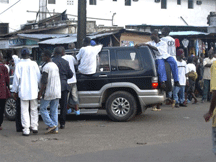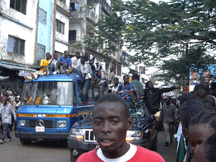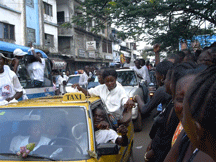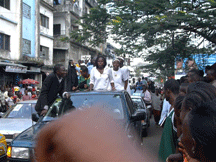
The Populist Appeal of Non-political Actors in Liberia
By Emmanuel T. Dolo, Ph.D.
The Perspective
Atlanta, Georgia
December 6, 2004
 |
 |
 |
 |
|
Weah Returned Home
|
Essentially, while these arguments are important, I believe such an analysis is impoverished by its lack of attention to the factors that have given rise to Weah’s populist appeal. More so, one has to look beyond Oppong Weah to better understand the growing phenomenon of populist rise to leadership in Liberia since he is neither the first nor the last. If the populist phenomenon were left unexplored, the current public discourse about the future of Liberia would portend bleak prospects. Why? The debates about Oppong Weah’s candidacy have failed to address the historical phenomenon, which birthed two previous populist regimes that disappointingly led to the depressing future being reversed by current efforts. I recall the populist appeal of Samuel Doe and the People’s Redemption Council (PRC), which arose from disappointment with and disdain for the TWP hegemony. I also recall the populist attraction of Charles Taylor, which emanated from disenchantment with and contempt for the Doe government. Those Liberians who are surprised by Oppong Weah’s populist appeal should reflect much more extensively on this subject. There is nothing shocking about this event, because it reveals the essence of a nation in despair and the craving of its people for authentic political leadership.
What factors have increasingly made the likes of Doe and Taylor popular, and now, are being approximated to Oppong Weah? What lessons have we learned from the past that can be applied to the present? What factors have created a situation in which someone whom a considerable segment of Liberians consider unqualified and a possible danger to the country’s future has become the most viable candidate for the nation’s presidency? Put another way, what factors have made Oppong Weah attractive and career politicians, opposition politicians included, unattractive although the nation has endured the wraths of Doe and Taylor? More importantly, if Weah were to succeed, which seems very likely, or before Weah does, what steps are necessary to prevent a possible giant sized catastrophe, namely, the reincarnation of Doe and Taylor? What is the role of the “educated elites” in averting the looming crisis? In this article, I will attempt to examine these questions, some fully, and others less so, while also probing their implications for nation building in post-conflict Liberia. Broadly, how do Liberians avert the third coming of tyranny, if that is truly the case?
The place to start is an exploration of the psyche of Oppong Weah’s supporters to understand the basis of their logic. What psychology renders a people who have endured suffering under previous despotic leaders to believe that their best alternative for change is a soccer player with no political experience? What psychology renders a people to turn their backs on career politicians and opposition leaders many of whom have fought with despots and even risks their safety for the sake of promoting democracy -- allegedly? Could it be that the elevated and chronic state of poverty as well as the erosion of quality of life have made the everyday Liberian less receptive toward career politicians and attracted them to non-politicians?
Liberians had the vision to rebuild Liberia into a beacon of democracy on the African continent following the overthrow of William R. Tolbert, Jr. But history has come to reveal that there were several missteps that followed and the virtuous dream was converted into a nightmare from which, every Liberian has not awaken. We embraced a military regime and lived under its punishing impositions on civil liberties. The magnitude of the failure to achieve this virtuous goal was magnified to the maximum as I watched many of my fellow Liberians exhibit “numbness” when they embraced Charles Taylor as the chief restorer of our freedoms. I have come to believe that the greatest mistake that Liberians made was the carnage wrought by our political leaders when they cuddled Charles Taylor and some aided him to terrorize, traumatize, and kill Liberians, despite his previous questionable democratic credentials. They did not learn from their experiences with Samuel Doe. The voting public in Liberia committed an electoral democratic suicide that occurred with electing Charles Taylor, but one has to ask what made Taylor attractive to the Liberian people? Is that same phenomenon responsible for the birth of Oppong Weah’s candidacy for the presidency?
Many of our career politicians and opposition leaders would prefer for us to be distracted by Oppong Weah’s candidacy and his populist appeal so that we fail to discuss the elephant in the room. I am in agreement with many of the commentators who suggest that Oppong Weah could be elected, but are doubtful of his capacity to govern. But the elephant in the room is clear. What are the characteristics of Liberian career and opposition politicians that have nurtured and sustained an anti-intellectual culture and created a loathing for career and opposition politicians? To understand this phenomenon is to examine the psychology and the record of a cross-section of the people who constitute Oppong Weah’s supporters.
I called Monrovia (Liberia’s capital), and talked to some former fighters who consider Oppong Weah next to Jesus Christ in saving Liberia from implosion. I also spoke to members of the Liberian academic elites (those with more than average educational attainments) who support Oppong Weah just as passionately as their fellow Weah enthusiasts that are ex-combatants. Here’s what I uncovered. First, the Oppong Weah campaign is a “rolling train and you can either get on it or standby, letting it roll. You will be left behind.” These were the words of a professional that lives in the United States with advanced degrees. She added that all of the candidates in the race were recycled career politicians, no matter the guises they wore, who had nothing substantive to offer the Liberian people. She added, “Oppong can turn to these career politicians and say emphatically: “You took us backwards and have shown a glaring inability to rescue us from the brink of extinction. Your record over the last twenty years is clear evidence that you are unable to bring about change when we needed it the most. Your inefficiency has resigned the fate of many Liberians who lacked bridges out of poverty to slums and ghettos.” Another US-based Oppong Weah supporter placed the issue within the broader context of the lives of the common Liberian man, woman, or child. He reminded me that: “The majority of the Liberian people are illiterate. The majority of the Liberian youth, who constitutes the fastest growing population is semi-illiterate and feels despondent because of the huge poverty gaps.”
Among the four former fighters living in Liberia with whom I spoke, I was able to draw very special insights. One respondent told me that the career politicians were unable to speak for them or represent their interest because they did not share their values. He noted: “We have grown up and know that the career politicians in Liberia are all about themselves.” A moving remark by another interviewee caught me by surprise. He remarked: “They do not see how humiliated we feel.” Cumulatively, I heard the view that these young Liberians were longing for someone whose words and most importantly their deeds depicted a commitment to their collective security and well being. I heard that they felt alienated and they saw in Oppong Weah, a person that was substantively connected to their suffering in ways that career politicians had not come to appreciate and value. A much older enthusiast of the Oppong Weah fervor gripping Monrovia who had earlier participated in opposition politics expressed his views even more passionately. He noted that they live in a radicalized state because as he put it: “We want to send a message to those condescending opposition politicians who think that they can just take us for a ride. They come in and out of our lives every time elections are about to happen then, think that we will be sitting there waiting for them like a second string girlfriend.” Having known this person for 20 years, he reminded me of the 1979 Rice Riots, in which the interviewee participated. “You remember! It was the Rice Riot that launched my interest in politics. I have not gone to school since I graduated from Tubman High School in 1980. They cannot just say that I am uneducated and it is this lack of education that makes me vulnerable. Perhaps they are right that it is my small education that makes me dangerous because I will not let their trick to exploit me happen again.” He closed with a strange grunt and then urged me to be different from the group he referred to as “those so-called opposition leaders who cannot decide what they want to be – politicians or academics.”
The mindset of the typical Oppong supporter is a fertile soil for research. It is the site at which one can draw lessons for understanding segments of the Liberian voting public. It is specifically a place where one can understand the anti-intellectual and lukewarm reception toward career politicians. I have come to surmise that the lay Liberian and the politically astute are both attracted to Oppong Weah’s candidacy because they are in a search for dignity. Liberians may also be fatigued from the well-rehearsed dance that career politicians and opposition leaders have exhibited over the years: all talk and limited or no results. Long resumes and big speeches no longer impress Liberians.
When illiteracy is rampant and poverty is paralyzing, the poor often finds an unlikely companion. There are many of the so-called cosmopolitan elites who vicariously identify with the suffering masses not because they are so selfless, but because like mirrors they see their own plights through the eyes of their fellow Liberians at home who are poor and illiterate. These are young professionals who may not culturally have much in common with Oppong Weah and his ex-combatant supporters, but find kinship with them because of their respective quests for a new Liberia. The marriage between Oppong Weah supporters from these two sides of the ideological spectrums arises out of a realization that rhetoric and posturing by career and opposition politicians are no longer useful. As such, they have become cynical and even distrusting of career and opposition politicians. It may not be true that all career politicians in Liberia and members of opposition groups were consciously hypocritical in their failure to deliver on public promises. But sadly, such failures have become so recurrent that the pattern has made Oppong Weah’s supporters to latch on to the prospect of change, even when they are unsure if the vessel of delivery may be just another Samuel Doe or Charles Taylor. Oppong Weah’s popularity serves him well. Oppong Weah’s history of good will toward the Liberian people has given them a glimpse that after 25 years they have not seen from his competitors.
There is a third set of Oppong Weah supporters, whose psychology is revealed by their historic track record, and is worth examining here. They lead exclusive lives and seek opportunities for exploiting populist fame for personal economic advancements. They include the likes of Dew Mayson and Emmanuel Shaw whose suggested links to Oppong Weah’s campaign for the presidency must also be analyzed to fully conjure up the nuances of the populist political phenomenon – Liberian style. It should be recalled that prior to the 1980 coup, which brought the PRC to power, both Shaw and Mayson worked in the Tolbert government. Shaw served as Deputy Minister of Economic Affairs at the Executive Mansion - a principal advisor and speech writer for the president. Mayson also served as a principal advisor to Clearance Parker, who was then Chairman of National Investment Commission (NIC). Immediately after the coup, these men joined the Doe bandwagon, and became principal players. It is widely known that Shaw was responsible for grooming Doe through several phases of personal development, which give him access to power and illicit wealth. Mayson succeeded Parker under Doe and was the principal architect in mortgaging Hotel Africa to a Dutch merchant, while serving as the Chairman of NIC. Mayson’s last job under Doe was Liberia’s Ambassador to France. Shaw was an oil tycoon during the Doe regime administering the TIGER oil company, which had exclusive importation rights of oil to Liberia. But when TIGER disintegrated, Mayson later collaborated with Shaw (serving in the background to avoid appearance of impropriety) and Mayson teamed up with some Nigerian financiers and became the sole importer of oil to Liberia from which both men amassed a lot of wealth. Immediately after Doe’s death, these two men again spread their economic tentacles into the confines of Charles Taylor’s regime serving as what Taylor called “his eminent persons” doing everything from gun-running to the sales of government property, oil mining, cell phone sales, etc.
With the two groups mentioned before seeking salvation from the woes of the past, this latter group (Mayson and Shaw) is bent on inflicting the wounds that caused Liberia’s current plight. Oppong Weah is a vulnerable actor, politically unsophisticated, an thus, these political hustlers who like leeches have fed on Doe and Taylor regimes (preys) are again like hawks, poised to devour any promise that Oppong Weah’s candidacy holds through their usual fraudulent scams. Mayson, Shaw, and their cronies in the business underground do not have anything in common with the first two constituencies. Note that the common Liberian and their educated counterpart both, who constitute Oppong Weah’s supporters, are joined at the hips. They are linked by an honest quest for deliverance – an end to their respective suffering. But for the Mayson-Shaw clan, they have demonstrated only one interest: double dealing that lands them illegal access to the purse strings of government. Unless Oppong Weah and his supporters are able to cut off their ties to these leeches, his constituents, particularly those Liberians who genuinely see themselves as one with him and thus hope for a better future through his candidacy will be disappointed once again. Oppong Weah may win, but the nation will be soiled in its infirmity.
This time, Mayson and Shaw and their cronies must be aware that defenses of Liberians committed to bringing about lasting democratic change have come alive. These Liberians have braced themselves for their next invasion and assault on their humanity. Supporters of Oppong Weah say that they are ready to call the likes of Mayson and Shaw out and ensure that they will not exploit Oppong Weah’s political innocence. A US-based Oppong Weah supporter who characterized himself as 15-year veteran of exile life reacted to my inquiry regarding this matter in these words: “No longer are we willing to be reactive, but proactive. If Oppong Weah succeeds, which he will, qualified Liberians in government, business and civil society will supplement his skill deficits and fend off those bent on criminal activities that have derailed national stability. We will not throw up our hands and give free reign to those who find value in mediocrity, cronyism, and corruption.”
What factors have created the anti-career politician culture that has given Oppong Weah a populist appeal and similarly radicalized young Liberians against opposition politicians? What concepts do we generate from a study of an “unholy” marriage between constituencies that have very little in common? Perhaps, this is the new battleground for democratic change in post-conflict Liberia. It is the way to attack the iconic landmarks of Liberian politics (individuals and organizations long associated with Liberian politics), motivating them to abandon their grand ideas and big slogans and commit to bringing about real change. Liberians have shown long patience with career politicians and opposition groups, and during the interim, they have developed a well-honed template for mounting an anti-career politician and opposition movement strategy. To excessively focus on the populist appeal of Doe, Taylor, and now Oppong Weah is to settle on a distorted view of the changes occurring among the Liberian electorate. By only seeing the popular appeal of the “wrong man,” they miss the fact that an inward search for where they went wrong is a key step in stopping the trend that is enveloping the nation. Career and opposition politicians have to realize that they are increasingly losing relevance and with that come an anti-intellectual culture because Liberians equate politicians and intellectuals. One thing that this indicates is that education is no longer the determining variable it once was for the electorate’s attraction to a candidate, but morals. Simply, the Liberian people are tired with educated rascals.
Instead of focusing on Oppong Weah’s limitations, they should concentrate on the factors that have procured populist appeals for people who lack stellar academic and political credentials. Dramatic change is occurring, and Liberians are moving away from central political figures that were hailed in the 1970s and 1980s. Liberians have embraced military men, warlords, and now a soccer player for their leader not because they are crazy. They are doing so because they are sensible, and moreover resolved to turn their backs on people who have failed to take them seriously and integrate them into the mainstream. This is a dangerous walk on the edges, but the voting public has a grievance that deserves to be acknowledged and validated. The lesson here is that people who disgracefully abuse the laws that they create and continue to show no propensity to change cannot expect to be given second, third, fourth, and fifth chances to exploit the suffering of the Liberian people. Liberians do not find resonance with political operatives who spew rhetoric and show no fruits in improving their lots.
Oppong Weah’s candidacy for the presidency is not a time-bomb ticking toward self-destruction, but a clear message that Liberians are far-sighted than we give them credit. It also depicts a political climate so devoid of viable alternatives that even the shallowest of the offerings can be rushed at the front of the line with the same prescribed prescriptions and their presidential aspirations taken seriously. Instead of demonizing Oppong Weah, it will do us well to dig deeper into the soul of our commitments to the Liberian state and its people. What force is stronger than a suffering people that are willing to do the same thing continuously, however risky, yearning for an opportunity to be rescued from themselves? Liberian politicians need to get out of the self-denial that they can continue to sell the electorate rhetoric that sounds like used car ads – shallow and superficial. The grasp of habitual triviality has had a stranglehold on politics in Liberia that it seems almost like a nicotine habit – very hard to kick. Unless we add depth to the quality of our analysis of why our nation keeps walloping in its wounds, we are doomed.
About the Author: Dr. Emmanuel Dolo lives in Maplewood, Minnesota with his family. He can be reached at edolo@hsicares.org.
